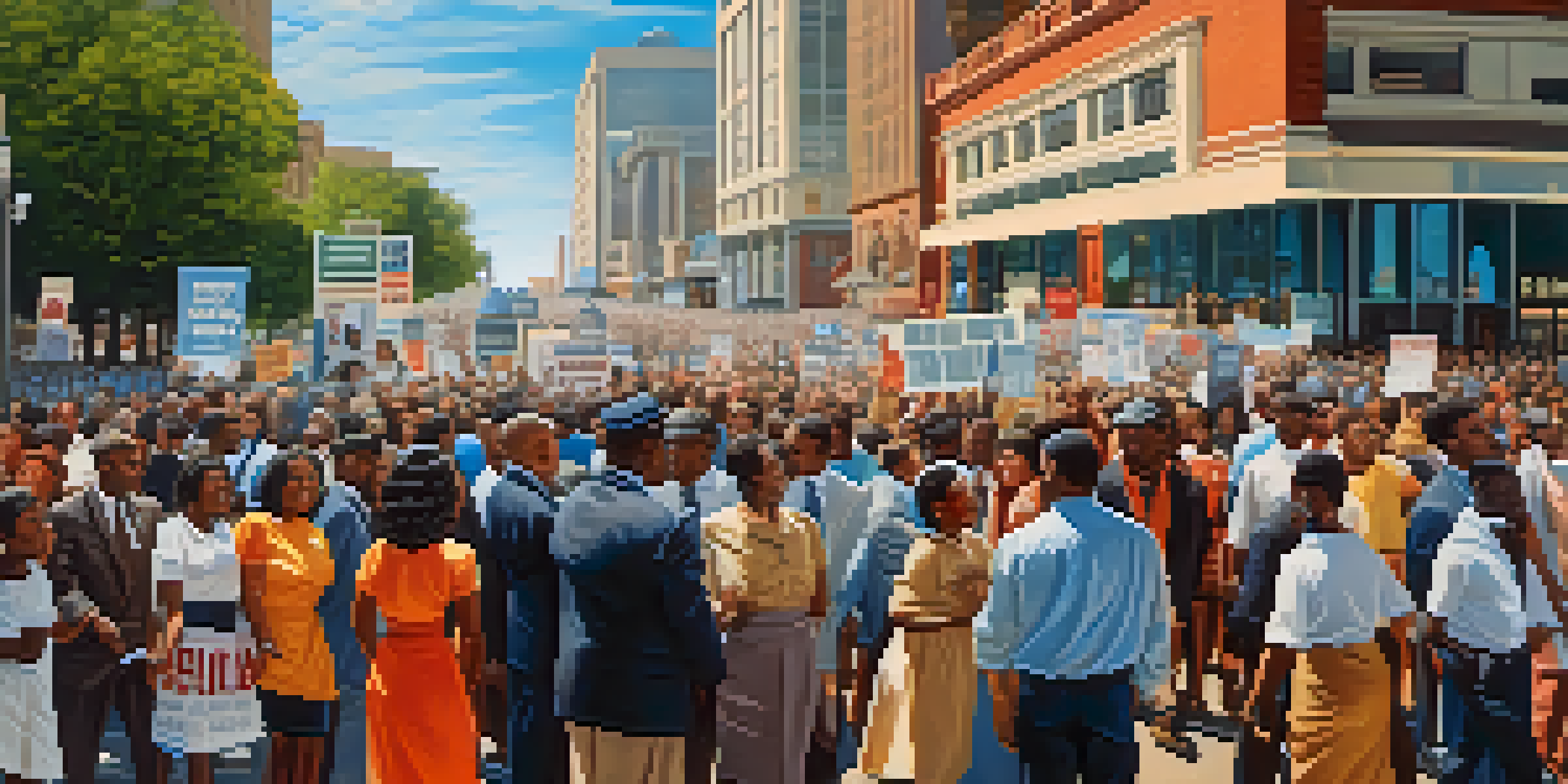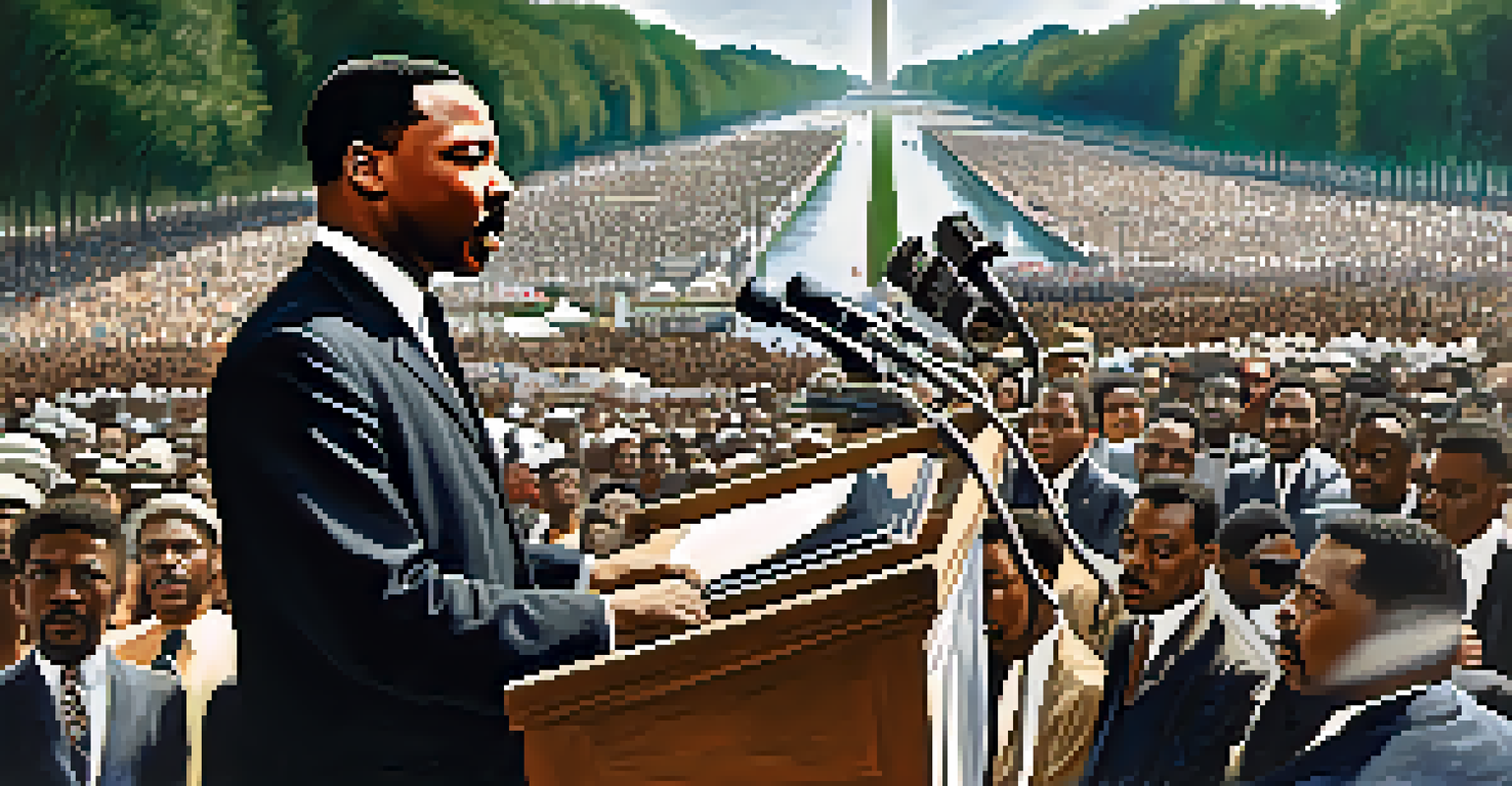The Southern Christian Leadership Conference's Atlanta Base

The Origins of the Southern Christian Leadership Conference
The Southern Christian Leadership Conference (SCLC) was founded in 1957, emerging from the civil rights movement's fervor. It was established to harness the moral authority and organizing power of Black churches to challenge racial segregation and injustice. Martin Luther King Jr. was a pivotal figure in its formation, serving as its first president, which underscored the role of faith in activism.
Injustice anywhere is a threat to justice everywhere.
The inception of the SCLC marked a significant shift in the civil rights movement, transitioning from localized protests to a more national approach. This organization aimed to mobilize individuals across the Southern United States, bringing together various civil rights leaders to strategize and promote nonviolent resistance. The Atlanta base became a hub for planning large-scale demonstrations and initiatives for social change.
With its roots firmly planted in Atlanta, the SCLC quickly gained traction, organizing campaigns that would reshape the landscape of civil rights activism. Events like the Montgomery Bus Boycott set the stage for future actions, and the SCLC's commitment to nonviolence resonated with many, making it a beacon of hope and change in the community.
The Atlanta Base: A Hub of Activism
Atlanta served as the headquarters for the SCLC, providing a strategic location for its operations. This vibrant city was not only a cultural center but also a crucial battleground for civil rights, making it the perfect backdrop for the organization's activities. The SCLC’s Atlanta base was instrumental in coordinating various campaigns and rallies, drawing attention to issues of racial injustice.

The organization utilized its Atlanta base to foster collaboration among various civil rights groups, uniting their efforts for greater impact. This collective approach allowed for more comprehensive action plans, addressing a wide array of issues, from voting rights to desegregation. The synergy created in Atlanta amplified their voices, making their calls for justice impossible to ignore.
SCLC's Founding and Vision
The Southern Christian Leadership Conference was established in 1957 to unify Black churches in the fight against racial injustice, with Martin Luther King Jr. as its first president.
In addition to organizing protests, the Atlanta base played a vital role in education and community outreach. SCLC leaders would frequently engage with local churches and organizations, spreading awareness and encouraging grassroots activism. This connection with the community helped to build a robust support system that fueled the movement's momentum.
Key Campaigns Led from Atlanta
From its Atlanta base, the SCLC spearheaded several landmark campaigns that would leave a lasting legacy. Notable among these was the Birmingham Campaign in 1963, which aimed to confront segregation head-on. The images of peaceful protesters, including children, facing violent opposition captured national attention and helped galvanize support for civil rights legislation.
Faith is taking the first step even when you don't see the whole staircase.
Another significant effort was the March on Washington for Jobs and Freedom in 1963. The SCLC played a crucial role in organizing this historic event, where Dr. King delivered his iconic 'I Have a Dream' speech. This gathering not only highlighted the struggle for civil rights but also emphasized the importance of economic justice, making it a pivotal moment in American history.
The Atlanta base's ability to mobilize and strategize led to the successful passage of the Civil Rights Act of 1964 and the Voting Rights Act of 1965. These legislative milestones were direct outcomes of the relentless advocacy and organized efforts originating from the SCLC’s Atlanta headquarters, showcasing the profound impact of their work.
The Role of Leadership in SCLC's Success
Effective leadership has always been at the heart of the SCLC's success, with figures like Martin Luther King Jr. and Ralph Abernathy guiding the organization's vision. Their commitment to nonviolent protest and civil disobedience inspired countless activists and helped solidify the SCLC's reputation as a moral authority in the movement. This leadership style emphasized collaboration and inclusivity, inviting diverse voices to join the cause.
As the SCLC evolved, new leaders emerged, each bringing unique perspectives and strategies. Leaders like Andrew Young and Jesse Jackson played pivotal roles in extending the SCLC’s reach, adapting its methods to align with the changing landscape of civil rights activism. This adaptability ensured that the organization remained relevant and effective in addressing contemporary issues.
Atlanta as an Activism Hub
Atlanta served as the strategic headquarters for the SCLC, facilitating collaboration among civil rights groups and amplifying their collective efforts for social change.
The Atlanta base fostered an environment where these leaders could thrive, emphasizing mentorship and community building. The SCLC’s leadership training programs aimed to equip the next generation of activists with the tools needed to continue the fight for justice, ensuring a legacy of empowerment and resilience.
Community Engagement and Outreach Efforts
The SCLC recognized that true change required deep community engagement, and its Atlanta base was central to these outreach efforts. The organization actively connected with local neighborhoods, hosting meetings and workshops to educate citizens about their rights and the importance of civic participation. This grassroots approach helped to cultivate a strong sense of community ownership over the civil rights movement.
Programs focused on voter registration, economic empowerment, and youth leadership development became staples of the SCLC’s outreach strategy. By addressing the immediate needs of the community, the organization built trust and fostered a sense of solidarity among residents. This engagement not only mobilized support for civil rights initiatives but also empowered individuals to take action in their own lives.
Through its Atlanta base, the SCLC also collaborated with other organizations to amplify their impact. Partnering with labor unions, educational institutions, and other civil rights groups allowed for a unified front, maximizing resources and efforts. This collaborative spirit underscored the importance of community in the fight for justice.
Challenges Faced by the SCLC
Despite its successes, the SCLC faced numerous challenges throughout its history. Internal conflicts and differing ideologies sometimes hindered progress, as leaders grappled with how to best address the evolving civil rights landscape. These challenges underscored the complexities of maintaining unity in a diverse movement with varied perspectives.
Additionally, external pressures from segregationists and law enforcement often posed significant obstacles. Activists faced violence, arrests, and intimidation, which tested their resolve and commitment to nonviolence. The Atlanta base became a sanctuary for those seeking refuge and support, demonstrating the resilience of the movement amid adversity.
Enduring Legacy of the SCLC
The SCLC's commitment to social justice continues to inspire contemporary movements and educational programs, emphasizing the importance of community and collective action in civil rights advocacy.
Financial struggles also plagued the organization, as sustaining operations and funding campaigns proved difficult. The SCLC relied heavily on donations and grants, which fluctuated based on public interest and political climate. Despite these challenges, the organization remained steadfast in its mission, continually adapting to ensure its survival and relevance in the fight for civil rights.
The Legacy of the SCLC in Atlanta and Beyond
The legacy of the SCLC continues to resonate, particularly within Atlanta, where its impact is still felt today. The organization's commitment to social justice and equality laid the groundwork for ongoing civil rights advocacy. Many contemporary organizations draw inspiration from the SCLC’s strategies and principles, highlighting the enduring relevance of its work.
Educational institutions in Atlanta, including Morehouse College, honor the SCLC's contributions through programs focused on social justice and community engagement. The teachings and philosophies of leaders like Dr. King are woven into the fabric of these institutions, ensuring that future generations understand the importance of activism.

Moreover, the SCLC's Atlanta base serves as a reminder of the power of collective action and community organizing. As new challenges arise in the pursuit of justice, the lessons learned from the SCLC's history provide valuable insights for today’s activists, reinforcing the idea that change is possible through unity and determination.